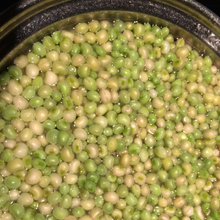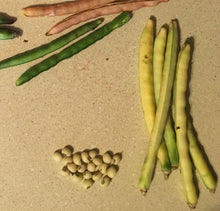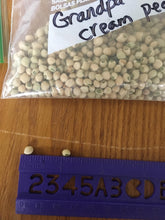'Grandpa McKay's Cream Pea' African Pea
Regular price
$4.25
Sale
Vigna unguiculata
Origin: Locust Bay, Arkansas
Improvement status: Landrace
Seeds per packet: ~45
Germination tested 11/2024: 92%
Lifecycle: Annual
It's not every day someone writes to us and says they have a treasured family heirloom seed they'd like to share. And it's even more unusual for the seed they send to be as unique and special as 'Grandpa McKay's Cream Pea.' This "southern pea" (or cowpea) — an African crop that was brought to this country by enslaved people hundreds of years ago — is significantly smaller than every other southern pea we've ever grown, with relatively short pods that are packed with seeds and produced in abundance. It's also a "cream pea" type, meaning it has a thin, pale, often fully see-through skin — allowing you to see the green heart of the pea almost until it's fully dried — and that it's best used fresh during the shelling stage. By harvesting when these peas are as plump and fat as they get, you can experience the most exquisitely creamy and delicious cowpea flavor imaginable. It's no wonder generations of people have kept up this variety, even as other family heirlooms fell by the wayside.
We got these seeds from Brittany Shipman who maintains these heirloom peas in the Arkansas Ozarks (along with an uncle in the Arkansas Delta). We asked her to send us what she can about this wonderful pea, and this was her response:
"Grandpa McKay is William Louie McKay, my mother’s grandpa. He was born in Calhoun, Arkansas on June 19, 1896 and lived in Locust Bayou. William and his wife Linnie raised their family of four there. He was a long-time cotton and corn farmer who also grew 'Arkansas Traveler' and 'Rutgers' tomatoes as well as our well-loved McKay Cream Peas alongside many other food crops such as sweet potatoes and watermelon to support his family.
My Mawma, Charlotte Taylor (whom Grandpa McKay called "curly") grew up eating the cream peas and they developed and grew as the family did. As each of the four children grew and had their own families they took seeds of Grandpa McKay's Cream Peas with them. My Mawma and Uncle (Stan Taylor) are the main proprietors of the crop, and I have added these lovely peas to my own garden.
This cream pea is wonderful for raising a large crop in a small area. It grows quickly and continues to produce pods filled with tiny peas until it is killed by frost. It vines readily and can be trellised. While originally grown in the sandy loam of the Arkansas River Valley it has done well in my family’s clay gardens in the North West of the state. When grown in a bed it grows thick and often shades out competition, making it easy to maintain.
The pods may be picked green but for ease of harvest [and for long-storing dried peas] it is best to wait until the pods have yellowed or dried. The peas themselves are typically a cream or green-tinted color."
For good measure, she threw in a family recipe too:
Ingredients:
1 quart McKay Cream Peas
1 generous spoonful of bacon grease
1 tablespoon garlic powder
Chunked Hog Jowl/salted pork
Salt and pepper and other spices to taste
1. Add enough water to peas to cover the top
2. Bring water to a boil
3. Add bacon grease
4. After grease has melted into water reduce to a simmer
5. Add garlic powder and meat
6. Simmer until peas are tender
Thank you, Brittany, for sharing your family's beloved cream pea with us and for encouraging us to share it with the world! We all owe you and your family a debt of gratitude.
These seeds were produced by our friend Lina Bird, a member of the new Ujamaa Cooperative Farming Alliance (UCFA), a Black and Indigenous-led growers' cooperative and seed company based in southern Maryland. UCFA exists to support farmers from historically oppressed communities, in particular by helping them get into seed farming as an additional source of revenue. The seed industry in the United States is largely run by white people (including us), who almost exclusively contract other white people as growers — though the majority of the seeds we sell trace their roots to non-European cultures. Black farmers, Indigenous farmers, Asian-American farmers, Latin American farmers, Arab American farmers, and other farmers of color have long been and continue to be routinely discriminated against in the course of doing business, including by banks, government agencies, middlemen or other buyers, and even neighbors. UCFA is working to bring some measure of justice to the seed industry, and we're proud to support them in their mission.






